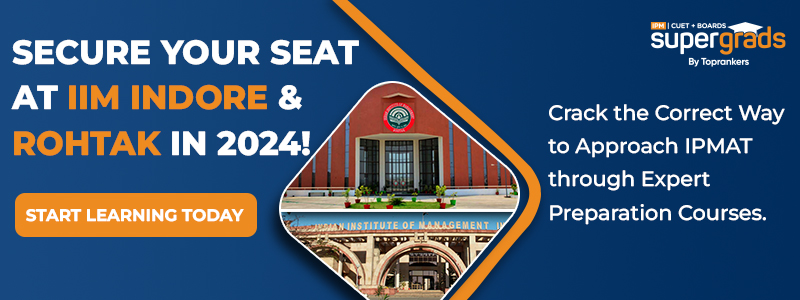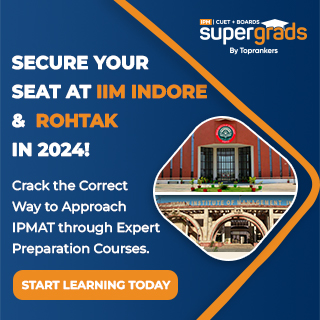How To Prepare for UG Entrance Exams 2025?
July 18, 2024
The Delhi University Joint Admission Test (DU JAT) is a national-level admission test for professional UG programs. Aspirants interested in DU JAT 2021 should plan their preparations systematically to score well. In this post, we'll go through strategies to do well in the verbal abilities section.
Aspirants must plan strategically depending on the level of difficulty of sections in order to qualify for DU JAT 2021.
It is critical for an aspirant to develop a section-by-section preparation approach.
They should assess his or her strengths and limitations and develop a DU JAT preparation strategy appropriately. In general, the verbal ability part is the simplest, with around 80% of the questions ranging from easy to moderate in difficulty.
Preparing well for this part can help you stand out.
Short Tricks to Prepare vocabulary for DU JAT, CUET, NPAT & IPMAT
The verbal ability section is an important part of almost every Management exam. To make the best of this section, aspirants should strengthen their understanding of words and build their vocabulary.
Vocabulary is one area where students frequently struggle. Many vocabulary-based questions are asked in DU JAT and IPM, either directly or indirectly through comprehension-based questions. You cannot answer these questions unless you have proper knowledge of words.
Some of the best ways to learn vocabulary are mentioned below.
Learn Words Through Mnemonics
In this method, we associate words with a mnemonic device that can help remember the definition and proper use. For example “Adage” means wise saying(proverb), we can associate adage with age, as wise saying comes with age.
| Word | Meaning | Mnemonics |
| Abase | To let someone down | we can relate it with base meaning down. |
| Anguish | Severe mental or physical pain, or suffering | Anguish is related to Angry+u+ish, Anger can cause pain and suffering to you. I still have that anguish that I lost my father last year. |
| Assiduous | diligent | Assiduous is related to Ass, like working hard like an ass. |
| Acclaim | Praise, applaud | Acclaim can be related to claim, like claiming for things you have done. |
| Asinine | Stupid | Asinine can be related to Ass, like stupid like nine asses. Example - she behaves like asinine. |
| Axiom | Self truth | Axiom is related to the word om, According to hindu mythology the om is the biggest truth(self truth) i.e Axiom. |
| Belligerent | Hostile, aggressive | Belligerent is remembered from a bully, like the harsh and aggressive behaviour of someone. |
| Alienate | To cause to turn away; make hostile; separate | Alienate is related to alien, meaning stranger, to alienate is to make someone turn hostile, or making someone feel alienated. |
| Allay | To calm the violence or reduce the intensity of; mitigate | Allay is related to All Okay! Just keep calm, everything is okay. |
| Ambrosia | The food of god, something very pleasing to taste or smell. | Ambrosia is related to Amber( Hindu god) and rasoiya(Cook in hindi) so the food of god, or something that you like very much. |
| Animosity | Hatred | Animosity is related to animal city, just imagine a city where you can see only animals fighting with each other. treat like Animals !! or pronounce animosity like 'Enemy's City. |
| Irik | To afflict with pain, vaxation, or fatigue | Irk is related to irritation, you irritate or annoy someone.”It irks him that his peers do not feel as strongly.” |
| Loiter | Hang around | Loiter is related to looter, looter loiters(hangs around) then they loot. |
| Anathema | Something regarded as curse | Anathema can be related as ANgry At THEM Always. For a lifelong outdoorsman like Phil, city living was anathema. |
| Amiss | Wrong, faulty | Amiss is related to A Miss, something that has gone awry in our plans. Example - if you think him guilty you judge amiss |
| Flaunt | Display ostentatiously | Flaunt is related to Aunt, Flaunting of things ostentatiously by aunts. |
| Admonish | To warn of a fault | Admonish is related to moni and punish. Example - my mom always admonishes me for everything. |
Clustering Techniques
Learning words in groups or clusters, like clusters of words meaning almost the same but differing in intensity. Like for example Abhor, Detest, Hate, Loathe, Abominate are all related to dislike with different intensities.
| Dislike | Abhor, Detest, Hate, Loathe, Abominate |
| Abandon | Evacuate, Leave, Quit, Vacate, Withdraw from |
| Abide | Accept, Bear, Endure, Put up with, Tolerate, suffer |
| Abolish | Abrogate, Annul, Delete, Destroy, Dispense with, Do away with, Eliminate, eradicate |
| Acceptable | Agreeable, gratifying, worthwhile, passable, satisfactory |
| Aggressive | Antagonistic, assertive, bellicose, belligerent, hostile |
| Agreement | Accord, compatibility, concord, conformity, consent |
| Allegation | Accusation, assertion, charge, claim, declaration |
Words Etymology
One of the best ways to learn vocabulary and understand a given word is understanding the root of the word. This means every given word is formed of a root to which we can add suffixes and prefixes to form new words. Learning just one root word can help you understand several words in English. So, by learning just 20 or 30 root words, you can expand your English vocabulary to include hundreds of new words.
A root can be any part of a word that carries meaning: the beginning, middle, or end. The prefix appears at the beginning of a word, the base in the middle, and the suffix at the end. Most English root words came from the Greek and Latin languages, for example: the base word “struct-.” It comes from the Latin word meaning “build.”
- Any English word you hear containing “struct-”* will relate to building, developing, or creating something. By itself, “struct” is not a word, but it is the basis for many words in English.
- For example, the word “construct” is a verb that means “to build.” The prefix “con” means “together” or “with.” So, "construct" means to put things together to build or create something.
- Adding suffixes to “struct-” creates additional words. For example, adding “-ion” in English makes verbs into nouns. When we add "-ion" to “construct," we get "construction," which means the process, or act, of building something.
- Adding the suffix “-ing” to “construct” makes “constructing.”
- Adding the suffix “-ive” to make “constructive” gives us the adjective form, and means helpful in developing or improving something.
| Root | Words |
| EGO Latin word meaning ‘I’ | Egoist: one who believes in self-advancement; selfish |
| Egotist: one who talks about his own accomplishments; A person who is excessively conceited or absorbed in themselves; self-seeker | |
| Alter Ego: one’s other self, like an alias. | |
| Egocentric: self centered | |
| ALTER Latin word meaning “other”’ | Altruism: philosophy of selfness, concern for the well-being of others above one's own. |
| Altruistic: interested in the welfare of others | |
| Alteration: A change | |
| Alter Ego: One’s own self | |
| To alternate: to take one, skip one | |
| Alternative: A choice |
Visual Recognition
We, as humans, have the ability to recall those things that we have seen visually and for a longer length of time. You will always recall phrases that make you think of anything aesthetically beautiful. Interestingly, information and expertise given via the use of those items would have been kept in our memory to this day. As a result, visual learning has been shown to be a valuable and successful technique.
- Ebullient :- cheerful and full of energy
- Robust:- strong and healthy; vigorous
- Perplexed:- completely baffled; very puzzled. Example - “she gave him a perplexed look”
-
Sanguine:- optimistic or positive
Verbal Ability Preparation Tips
- Read the newspaper regularly for about 1 - 1.5 hours preferably from the editorial section of The Hindu within the specified limit to prepare you for the time management required in the exam.
- While reading, underline the important things and try to think about the questions that can be framed.
- Apart from academic books, reference books like Word Power Made Easy by Normal Lewis and Martin English Grammar and Composition would definitely provide you a plus point in the Verbal Ability section.
- Note down all the difficult words in a revision notebook, and when you come across a word that has a similar or opposite meaning to a word you have already noted down, then add that word in front of that word. This is the best way to crack synonyms and antonyms.
- Try to learn at least 10 new words daily and note down the meaning and example of each word you find unfamiliar or difficult to remember. This is the best way to cover Synonyms and Antonyms.
- Make sentences out of the idioms/phrases and this trick will help remember what was learned.
- practice as many mock and previous year papers as possible to crack the exam comfortably. Also, a set of repeated questions will be asked each year in the exam from the previous year's papers, so it will be easier to score marks in the exam.
Vocabulary questions for DUJAT, CUCET, NPAT, & IPMAT
Directions( 1- 2) choose the option that is most appropriate to make the sentence complete and meaningful.
Q1. retail fetters customer good companies which are having a free run exploiting___ customers will have to be more transparent while doing business.
a. Knowledgeable b.gullible c. difficult d. Fussy
Q2. The cloning technique is in its infancy and is ____ with problems, both medical and ethical.
a. fraught b. revealed c. framed d.established
Directions (3 - 5)Find the correct option having either the same or opposite meaning
Q.3 Eccentric
a. Weirdo b. Altruism c. dacoit d. Ascetic
Q4. Coup
a. Aversion b. Massacre c. status quo d. Fratricide
Q.5 JINGOISM
a. Nepotism b.egoism c. chauvinism d. Darwinism
Q6. Select the option that is NOT an antonym of another word by way of adding the prefix ‘in-’.
a. Ineligible b. Inhibit c. Infrequent d. Indecent
Q 7. Select the option that is NOT an antonym of another word by way of adding the prefix ‘un-’.
a. Unaccountable b.Unabashed c. Unanimous d. Unequivocal
Q 8.One who is ____________ _ gets on with his job in spite of obstacles, while the one who is __________ hardly shows any progress. The latter spends all his time ___________ about his troubles.
- artful, doubtful, speaking
- assiduous, querulous, whining
- hardworking, dishonest, gossiping
- hotheaded, scared, cryingQuestion
Indirect Vocabulary based questions for DUJAT, CUCET, NPAT, & IPMAT
Read the following passage and choose the answer that is closest to each of the questions that are based on the passage.
As I write this essay, I am overwhelmed by what human beings can accomplish given time and space. As I look through my window, planes are flying over smoke that lazily ascends from the industries beneath them; vehicles fill every available space along the streets as the news reports another successful rocket launch on its mission to Mars. If only the views of the unborn mind could be trusted, I would have been born centuries earlier. In the current world that is driven by fear over global climate changes, global warming, global economic recession, global terrorism amidst a host of many other global concerns, I cannot help but bury my head in the peaceful moments experienced only during the dinosaurs' age. Though that age is considered by many as having been uncivilized and backward, the generations lived in a serene, enclosed and self-contained environment. For example, a cure for most of the human health challenges was at reach within the households' unpolluted gardens and the weapons of mass destruction did not exist.
Q1. What is the tone of the author in this passage?
a. Appreciative b. Pessimistic c. Sardonic d. Sarcastic
Q2. Which word is the opposite of anxious used in the passage?
a. Uncivilised b. Serene c. destruction d. Overwhelmed
Q3. Which word used in the paragraph is the best synonym for swamp?
a. Ascend b. Enclosed c. amidst d. Overwhelmed
As defined by the geographer Yi-Fu Tuan, topophilia is the affective bond between people and place. His 1974 book set forth a wide-ranging exploration of how the emotive ties with the material environment vary greatly from person to person and in intensity, subtlety, and mode of expression. Factors influencing one’s depth of response to the environment include cultural background, gender, race, and historical circumstance, and Tuan also argued that there is a biological and sensory element. Topophilia might not be the strongest of human emotions— indeed, many people feel utterly indifferent toward the environments that shape their lives— but when activated it has the power to elevate a place to become the carrier of emotionally charged events or to be perceived as a symbol.
Q4. The word “topophobia” in the passage is used:
- to represent a feeling of dread towards particular spaces and places.
- to signify the fear of studying the complex discipline of topography.
- as a metaphor expressing the failure of the homeland to accommodate non-citizens.
- to signify feelings of fear or anxiety towards topophilia people.
Previous year Vocabulary questions
Q1. Quantum Physics really begins to point to this discovery. It says that you can’t have a universe without a mind _______ into it, and that the mind is actually _______ the very thing that is being _______ .
- getting, creating, acknowledged
- intruding, making, construed
- entering, shaping, perceived
- penetrating, forming, seen
Q2. In response to my friend’s request, I decided to write her a letter, which i hoped would be honest and practical, while also serving as a ________ of sorts for my own feminist thinking. This book is a ________ of that letter, with some details changed.
- Map, version
- chart, form
- base, fallout
- guide, precise
Q 3. That the artiste went about systematically to get traditional __________ and designs back into the mainstream and __________ a textile culture for dance is to be celebrated.
- practices, processed
- motifs, created
- totems, evolved
- stories, described
Q 4. The ________ of multiculturalism, in times of war or economic _________, tribalism is what causes those powers to confine groups of people with different _________ into ghettos or in communes on the margins of their cities.
- rise, doldrums, ideologis
- Tyranny, growth, habits
- antithesis, prosperity, persuasions
- opposite, distress, ethnicities
Q5. One who is _________ gets on with his job in spite of obstacles, while the one who is _________ hardly shows any progress. The latter spreads all his time _________ about his troubles.
- Artful, doubtful, speaking
- Assiduous, querulous, whining
- hardworking, dishonest, gossiping
- hotheaded, scared, crying
Q 6. Few look forward to old age and all that it brings in its wake - deteriorating health, loss of vigour, restricted mobility, increasing dependence on others, not to mention a sense of foreboding and anxiety. Yet, one has to learn to cope with the onset of old age. Firstly, it is imperative to prepare to accept old age in spite of the restrictions or limitations it imposes on one's mobility. Equally important is the need to adopt a positive attitude towards life. ___________________ Above all, peace of mind, is the efficacious balm that brings equanimity to one's life. We must resign ourselves to growing old, and in the process let us try to make life as fulfilling and meaningful as possible.
(a) The role of humour and fun are indispensable as these are the spice of life and guaranteed to bring cheer and bonhomie, besides keeping one's mind off life's grim realities.
(b) Owing to advances in medical science, we can now expect to live well beyond 90 years.
(c) Physical debility and stiffening body joints 'creaking' in protest may make mobility difficult - something one should learn to take in one's stride stoically.
(d) Turning nostalgic and recalling 'those good old days' when they were young and life was radically different from what it is today, help one accept old age.
Q 7. ________________________ Infrastructure, in the form of paved surfaces, disrupts water absorption and lowers water retention. This leads to disastrous levels of flooding which diminishes biodiversity and impoverishes the people of the region. Land should be used mindfully to prevent water logging during heavy rains.
(a) Climate change is not the only cause for flooding.
(b) Flooding can happen after heavy or low rainfall.
(c) Infrastructure can actually cause a lot of trouble during flooding.
(d) Water retention is less important to prevent flooding.
Q 8. Read the following passage and choose the answer that is closest to each of the questions that are based on the passage.
The perennial debate over gender differences threatens to remain inconclusive. Stereotypes pertaining to male superiority and female submissiveness could be traced to earlier ages where assigned roles were needed as survival measures. But, can we today see a swing away from these stereotypes, or have they established a stranglehold on our perceptions? In this gendered world, we continue to live with notions that one's gender determines one's skills and preferences, from toys and colours to career choices. So the girl child will be presented with a Barbie doll, while the boy child will receive a Lego set.
Does that mean that our brains are different? This myth has been exploded by a British professor of cognitive neuroimaging. Her research attempts to establish how these stereotypes mould our ideas of ourselves. She examines how science has been misinterpreted or misused to ask the wrong questions, instead of challenging the status quo. She urges us to move beyond a binary view of people's brains and instead to see these as highly individualised, profoundly adaptable, and full of unbounded potential. Her conclusive findings establish that no brain differences can be found that are solely gender related. In other words, modern neuroscientists have identified no decisive category-defining differences between the brains of men and women.
Q1. The synonym for 'stranglehold' (Para 1) is
(a) asphyxiation (b) containment (c) prohibiting entry (d) overwhelming control
Question 72
Q 2.The antonym for 'unbounded' (Para 2) is
(a) imprisoned (b) aggressive (c) restricted (d) fearful
Frequently Asked Questions
What is the syllabus of the Verbal ability section of DU JAT, IPMAT and NPAT?

What is the exam pattern of IPMAT 2021?

How can I improve my score in the IPMAT and DU JAT verbal reasoning questions?

How to prepare for the verbal ability section in the last two months ?





